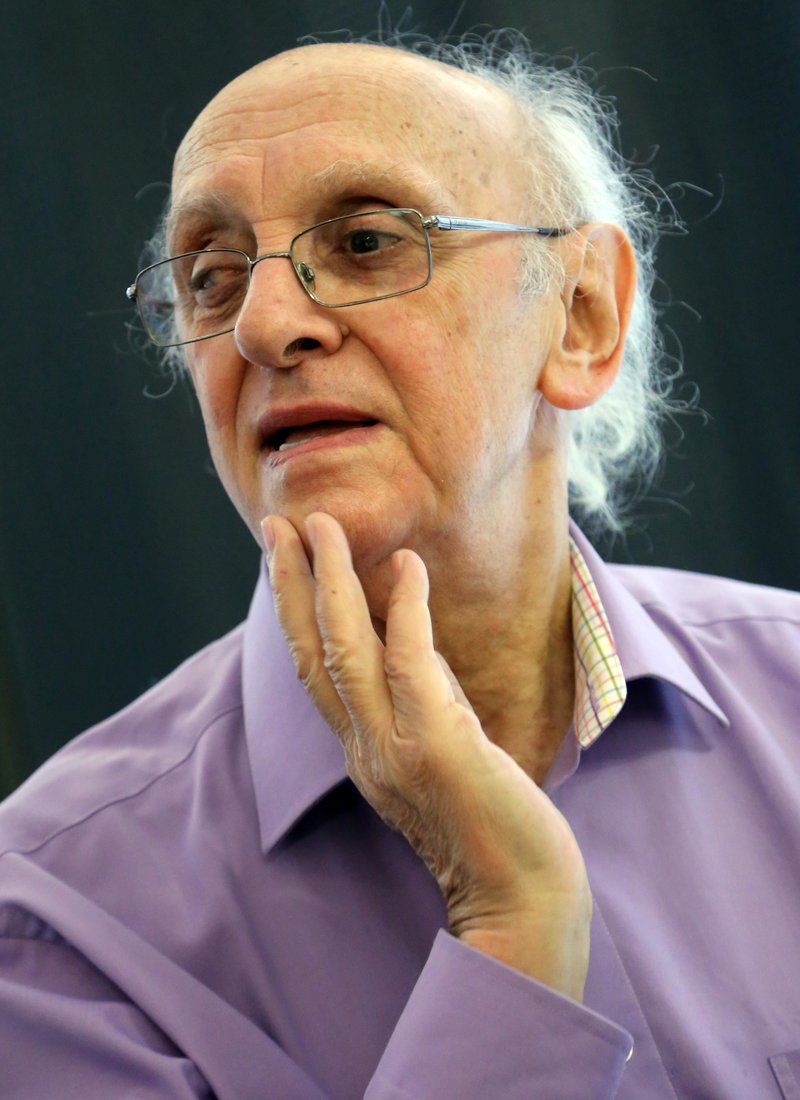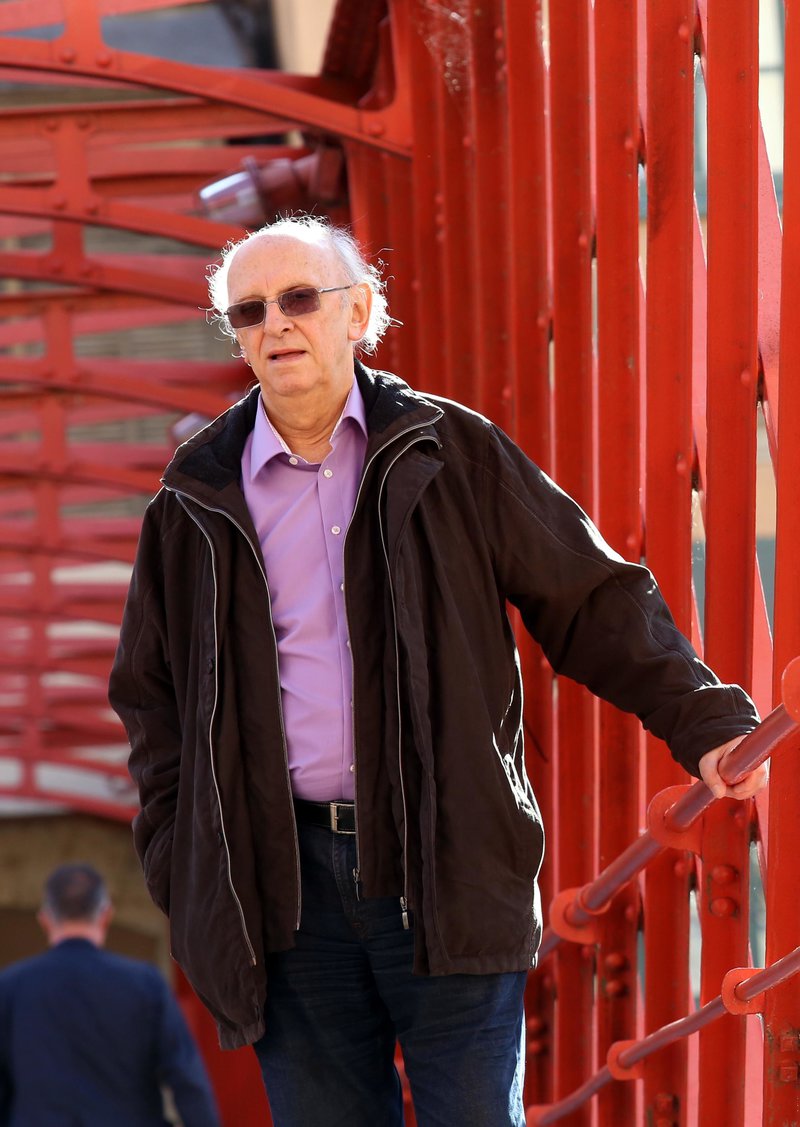You are about to receive the Liberpress literary award. How do you feel about it, and about Girona?
I am very happy and honoured and it has been a surprise to be selected. It's my second time in Girona; I was here in May at the Mot festival when I visited the city and loved it.
What is the situation in Greece?
Greece is going through very difficult times. On the one hand, there is a big part of the country suffering, and there is a mini-political class only concerned about the internal games of the political crisis. The third part of this triangle is Europe, and the austerity measures they imposed. In order to fight and achieve, people need a perspective, and this is something that doesn't exist at the moment; on the contrary, people don't believe that these measures are even applicable. So I don't know how the country will get out of this mess, the mess of destroying the middle class, the mess of the political landscape, and the mess of the austerity measures. So I don't know if there is a way out.
Is there little place for hope in Greece?
If you ask the average Greek if they still hope for something, nine out of 10 will tell you to forget it, there is no hope.
What about yourself, what do you think?
I am not a politician, but I can tell you that what is happening now is the result of a series of mistakes and wrong decisions, mainly from the Greek side, not the European. We've made huge mistakes, but Europe didn't want to see the magnitude of the problem and didn't take measures until now. The wrong decisions and the false steps of the Greek government deprive us from being able to say to the Europeans: “Come on, what are you doing now?”
Which mistakes are you refering to?
These mistakes go back a long time. Since the beginning of the 1980s, when Greece entered the European Common Market, money started coming into the country in amounts never seen before. The government of that time distributed the money to their cronies in the system and thus we missed the opportunity to build up an investment policy. The Europeans never controlled how the money of the European tax-payers was spent, when the truth is that they went there to do business. And when the subsidies were over, they started to ask for huge loans. I was so against the Olympic Games. It was a silly, a huge mistake.
Why was that?
We've asked for so many loans and we've never been able to pay them back. Throwing money away that way just for three weeks! The establishment got rich with it, but the people are still paying for it. Another serious mistake was that we should have first made the necessary reforms and after that enter the eurozone. So, I think the EU is not responsible for our problems, we are. We can't expect others to be more sensitive to our problems than ourselves.
Is there a lot of corruption in Greece?
Look around you: see Volkswagen, Blatter...you think corruption in Greece is bigger than this? No. I've heard this story about corruption in Greece many times, but it is in small companies, small-scale corruption. The next time the Germans ask me about corruption in Greece, I have my answer prepared (he laughs).
You were very critical of Syriza a few months ago and Tsipras has been chosen as prime minister again. What do you think of that?
I am still very critical of Syriza. People have decided, but this is not the point. Those who voted for him are a 35% of the 57% who went to vote. I am among the 43% who didn't vote. We live in a country with almost 44% of voting abstentions. And this is a problem that should make them think.
In your books you describe a society in crisis, about to lose its values. You once said that Greeks knew how to be happy with very little. Has this changed?
Yes, indeed. I've always said that Greece was a poor country with a high level of culture. And this got lost. In the 30 years of wealth in Greece, which began in early 1980s and ran through to 2009, people stopped thinking about poverty, and along with it, the values of poverty. Now they are going back to poverty without any values, and this is a huge problem.
What values do you mean?
Being happy with small, minimal things. They could be happy sitting for hours in a tavern with a cucumber, tomato, two sardines and a glass of wine and be happy. Also the way of understanding creation and culture; this got lost, too. The problem with Greece is that it was a country that was fed intravenously. Any student of medicine knows that once you cut the intravenous nutrition you have to adapt the patient slowly to normal food: first soup, rice, and so on. What happened to us is that they cut it off and they put in front of us pork and potatoes. It was too much and the country got sick.
In your latest book, Fins aquí hem arribat, you point out the origins of the crisis and how it affects ordinary people.
I try to explain that the country cannot be fixed, but it has to be rebuilt from scratch. The crisis will be deep and the disaster is massive. This can't be fixed with a few measures. This needs to be rebuilt and this means that the political and economic forces, education, culture have to work together. I know it's not easy and it will not be done tomorrow, but it is a real need.
You have mixed origins, which are also reflected in your books.
Yes, I was very lucky. Having different origins is a source of inspiration and it helped me understand the diversity of cultures. The frontier between Albania and Greece, Epirus, used to be the poorest and purest part of Greece. I decided that inspector Jaritos came from there for the values and the decency of those people, who are still keeping to tradition and the old customs.
Do you have more plans for inspector Jaritos?
I am writing another book, not about crisis, but post-crisis. I don't have any plans when I write a book; I discover it as it happens, the same as my protagonist. Now I am at a point where I don't know what is going to happen. I plan to finish the book by the end of January next year.
Is there a lot of yourself in Jaritos?
Not a lot, but there are a few things. We have common features, his points of view on the city and the people are similar to mine. My daughter tells me: “I am fed up of hearing your jokes about Athens and the Athenians and then reading them in your novels. You have to find something else, you know?”
Are crime novels a pretext for social criticism?
Yes, in the last 30 years, and in fact ever since Dickens, Dostoyevsky, Balzac and Zola, we've been using the crime novel to denounce social problems. That's why the crime novel nowadays is practically the only social novel existing in European literature. Other genres focus more on the character, but in the case of the crime novel it's more a mixture of bourgeois and medieval novel. In the same way Quijote went from village to village to fight, Jaritos goes from novel to novel to discover injustice and unravel crimes.
Is Jaritos a modern Quijote?
Yes, they all are. Our characters are more sociable than Sherlock Holmes and the protagonists of classical novels. There are no genius inspectors. Carvalho wasn't a genius, I am not a genius, neither is Jaritos. Neither Montalbán, nor Camilleri. They are ordinary people who do their job, and by doing it they discover social problems and injustice.
Do you read a lot of crime novels?
Yes, I do: Italian: Camilleri, Di Cataldo...I learned a lot from Montalbán, Andreu Martín and Ledesma. Also from the French. But I am fed up with the Scandinavians: I can't read any more about writers who only feed themselves with pizza and beer. What I like about the Mediterranean novel is the connection with gastronomy. There is a balance between solving crimes and enjoying life. Scandinavians, meanwhile, have a more evangelic, protestant way: only solving the crime. I don't understand why a detective, in order to be successful, must have a disastrous personal life. Jaritos has a happy family life, he loves his wife and daughter, his son-in-law, and so on. In the south of Europe and in South America, readers identify themselves with the family, too, not just with the inspector.




